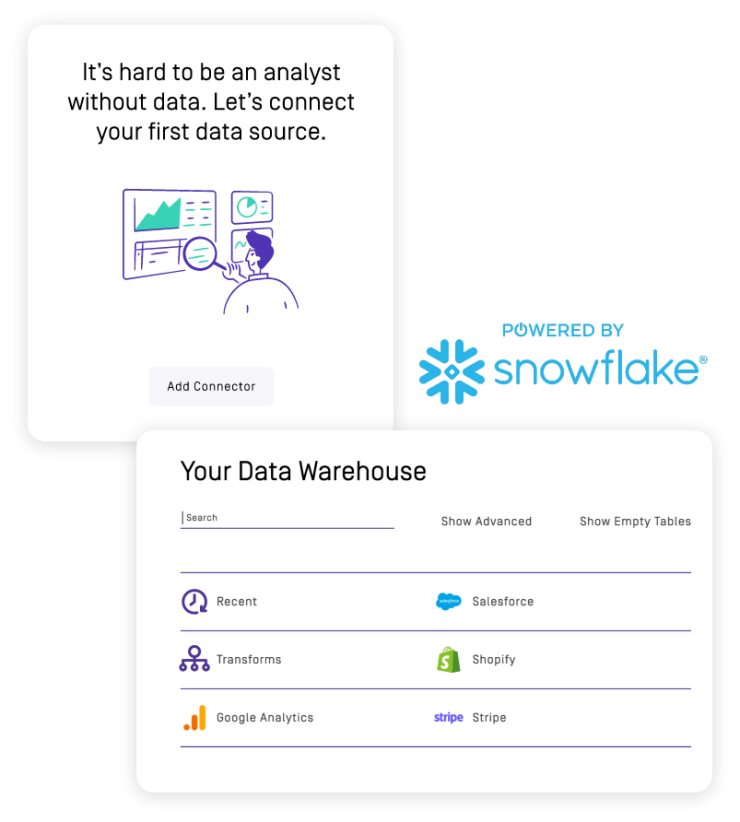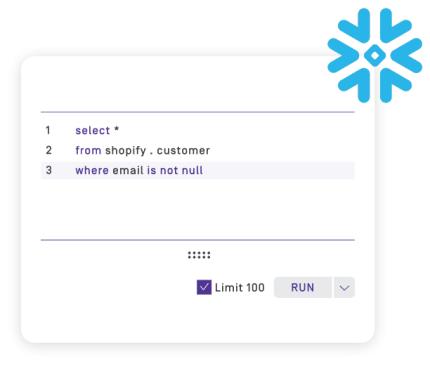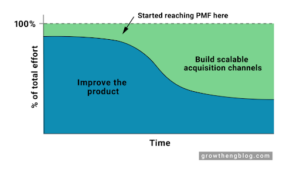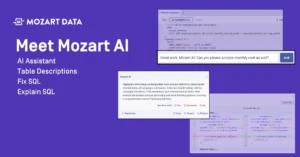Access your data in one place with a best-in-class data warehouse
Data centralization is essential for comprehensive analytics, faster decision-making, and better overall business performance.
- Use a best-in-class Snowflake data warehouse for data centralization
- Automate the process of centralizing and combining your data for analysis — no more copying-and-pasting from CSVs
- Build trust in data with a universal source of truth for your whole company
The benefits of data centralization with Mozart Data

Get a Snowflake data warehouse, or bring your own
Instantly set up a Snowflake data warehouse through Mozart Data. If you already have a Snowflake account, plug it into Mozart in minutes to connect to 400+ data sources and access the rest of our platform.
Access advanced analytics
Without a data warehouse, you’re missing out on impactful analysis. You don’t have a fast, reliable way to combine data sources (and are stuck copying and pasting from CSVs). Without combining data sources you’re stuck using limited reporting tools in your data sources.
You can try querying your production database for analytics, but it’s too slow and will bog down — or worse, freeze your website or product. You need a data warehouse that is designed for handling analytics projects large and small.
Focus on the essential tasks
When you aren’t endlessly combining and cleaning data manually and trying to force your business intelligence tool to work with faulty data, you can hone in on the insights you need for high-priority projects. Drive revenue and optimize your functions when you’re working with the right tools.
Democratize your data
When you trust your centralized data, you can give your entire team access to that universal source of truth. Avoid disputes over definitions and metrics on the way to helping everyone make data-driven decisions.
Save time and money
Saving time on analytics helps you act decisively, but it also saves you money. Mozart can help you optimize your data processes, so you aren’t wasting computing resources that run up your bill. You can accomplish all of this with far fewer technical personnel than if you wanted to achieve these results on your own.

Frequently asked
questions
Mozart Data offers a best-in-class modern data stack, which is why we chose to partner with Snowflake — the leading cloud data warehouse. Snowflake is extremely secure, supports standard SQL, so you don’t have to learn a new programming language, and makes it easy to control your costs since you only pay for what you use.
Yes. If you already have a Snowflake data warehouse but want the benefits of a full modern data platform, we can connect your warehouse to the rest of our tools.
Yes. We give our customers their Snowflake credentials to access their warehouse directly through Snowflake. For the most part, our customers access their warehouse through the Mozart platform.
Although we provide most of our customers with a warehouse, all of our customers continue to own their data.
If you become a Mozart Data customer, your data goes with you if you ever decide to transition off of our platform.
Become a data maestro

Using Sigma with Mozart Data
Overview Hey there – we’re diving into an exciting walkthrough of how to integrate Sigma Computing (“Sigma”), a business

Customer Analytics for Startups
This post was written by guest author Trevor Fox. Every startup of a certain size, at a certain degree of


